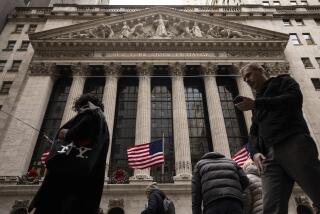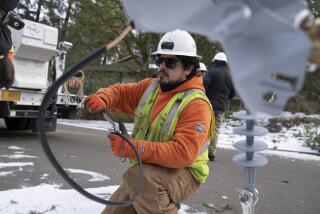Recession Ended in Late 2001, Experts Say, Even Though Payrolls Continue to Shrink
WASHINGTON — The chief arbiter of the nation’s business cycles said Thursday that the most recent recession ended in November 2001 -- even though more than 1 million private-sector jobs have been lost since then, driving the unemployment rate up, not down.
The decision by the National Bureau of Economic Research to declare a recovery could prove politically loaded, since, long after the recession’s officially avowed end, payrolls across the country are still shrinking.
Some analysts said the decision could finally put the lie to the popular view that spurring growth -- as President Bush has sought to do with repeated tax cuts -- translates quickly and directly into more jobs.
“Since World War II, Americans have always assumed that when the economy picks up, so do jobs,” said Wachovia Corp. chief economist John E. Silvia. “But that’s just not what we’ve seen this time.”
Members of the bureau committee that made the decision acknowledged being disturbed by the failure of the job market to revive in tandem with the economy. “The employment and unemployment numbers made our job very difficult,” said committee member and Harvard economist Jeffrey A. Frankel.
But in fact, the declaration by the bureau, an academic group that the government recognizes as the principal referee of when recessions begin and end, was an indication that mainstream economists have come to accept the break between jobs and growth as almost routine.
The bureau said it couldn’t wait for jobs to catch up with the gross domestic product, the most widely used gauge of the goods and services produced in the U.S. and the principal measure of whether the economy is growing. “It is output that we care about, and GDP is the broadest measure of output,” said the committee’s chairman, Stanford economist Robert E. Hall.
By that measure, he said, the economy has grown 4% from its lows of late 2001.
The committee’s action wasn’t the first signal of a weakening in the link between jobs and growth. In congressional testimony this week, Federal Reserve Chairman Alan Greenspan repeatedly noted that productivity gains -- increases in output for a given amount of labor -- have allowed companies to meet growth-spurred increases in demand even as they cut jobs.
Hall said Thursday that even in the post-recession jobless recovery of the early 1990s, the committee didn’t declare the downturn’s end until it had seen several months of improving employment data.
Indeed, Labor Department statistics show that private-sector payrolls had been rising for nearly a year -- and the unemployment rate declining for six months -- by the time the panel was willing to declare that the early-’90s recession had ended 21 months earlier.
By contrast, private employment has fallen steadily since January and in 15 of the months since the recession’s end.
The panel’s affixing of the end of the recession in November 2001 means President Bush has presided over a longer jobless recovery than his father. The former president is widely thought to have lost his 1992 reelection bid because of a weak economy and poor job market.
The newly declared ending date for the recession could undermine one of the current president’s chief explanations for the economic difficulties the country has encountered during his time in office, namely that they are fallout from the Sept. 11 terror attacks in 2001.
If growth resumed only a few months after the attacks, political analysts said, the economy was less affected by the assaults on the World Trade Center and the Pentagon than Bush has suggested.
Democrats appeared to grasp the political hay that could be made of Thursday’s declaration.
“The recession may be over for President Bush, but it’s not over by a long shot for millions of unemployed workers,” said Rep. Pete Stark (D-Hayward). “As we’ve seen with the war in Iraq, we may declare victory, but we will continue to suffer casualties from this recession.”
At the White House, spokesman Scott McClellan said, “There are a lot of people who are looking for work, and as long as there is one person looking for work that cannot find a job, the president will not be satisfied.”
According to the bureau, the 2001 recession, which started in March of that year, was slightly shorter than the average downturn since World War II.
More to Read
Inside the business of entertainment
The Wide Shot brings you news, analysis and insights on everything from streaming wars to production — and what it all means for the future.
You may occasionally receive promotional content from the Los Angeles Times.










